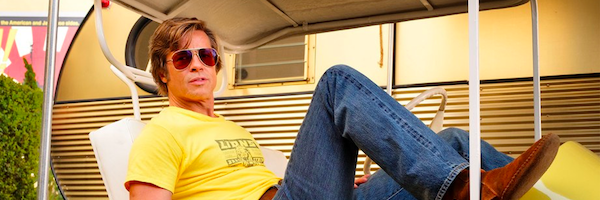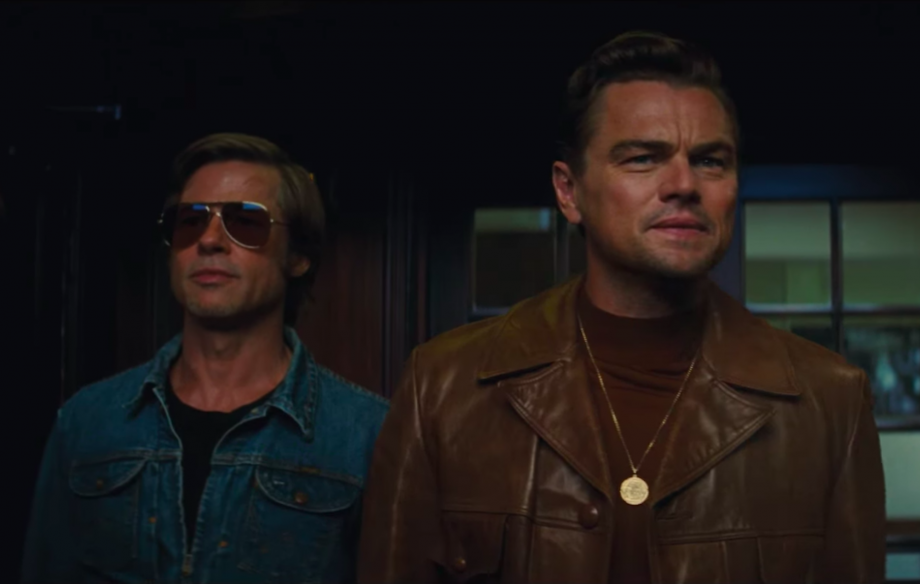Once Upon a Time in Hollywood: The Inner Workings of the Film
- Cameron Broadhurst

- Aug 25, 2019
- 7 min read
(Spoilers ahead: Only read if you've already seen the film.)
The hype and reviews surrounding Tarantino’s new film have been exhaustive, with endless youtuber fan theories and online criticism dealing with the film in diverging ways. The latter dealing often with apparent film ethics and aesthetic appreciation, the former filled with easter egg hunts for the endless television and film references that fill the story and the mise en scene of the film’s 1969 world.
The rewriting of history that the film attempts, with today’s Hollywood icons remaking the fate of yesteryear’s Hollywood counterparts has struck a chord with many in its reworking of historical fact. This is of course similar to Tarantino’s earlier Inglorious Basterds. Much of the online criticism for Once Upon… has delved into Tarantino’s treatment of women, Bruce Lee and its two male white leads - wondering to what extent the film has a moral or immoral core, even as it throws us with nostalgic fury into the end of 60s Hollywood.
And yet, the substance of my piece here is something that almost none of this criticism is dealing with - the inner layer of the film. It is to some extent masked from viewers unfamiliar with the director’s story and context. While the outer layer of the film is clearly about 1960s style Hollywood coming to an end with the Manson murders, particularly of Sharon Tate, the inner layer of the film is actually concerned with much more recent turmoil in today's Hollywood.
Contrary to what Tarantino is reported to have said, Rick Dalton and Cliff Booth's relationship is really the heartbeat of the film. Margot Robbie’s perfomance of Sharon Tate, is given very little dialogue and is thinly characterised. She appears to be a cypher for an age of innocence. The similarity between Dalton and Tarantino has already been much commented on: both men in the apparent twilight of their Hollywood filmmaking careers, establishment figures still doing their thing while Hollywood around them has moved onto other kinds of movies (the chief difference being Dalton is only moderately successful, while Tarantino is hugely successful). Dalton goes to shoot a spaghetti western as a kind of swansong in the movies before becoming a TV regular, while Tarantino takes the very title of this film from spaghetti western director Sergio Leone’s ‘Once Upon a Time…’ series. Tarantino appears to use the Dalton character to poke fun at his own self absorption and sense of artistic calling. So far so clear.
But what has not been much noticed or directly pointed out is the deep parallels between Cliff Booth and another man who Tarantino has, for his prior eight films before this one, been inextricably intertwined with. And that is Harvey Weinstein. On the surface they seem dissimilar. Cliff Booth is handsome, athletic, charismatic drifter type - not qualities we now associate with Weinstein. But the parallel lies not in the personality but in the deep relationship between these two characters, and the hidden violence that the story calls into question.
Weinstein and Tarantino were film partners for around 25 years, and Tarantino owes a large part of his success to the backing of Weinstein. To be clear, Tarantino has expressed his deep regret at not acting more strongly on what he heard about Weinstein earlier on - finding out more later of the depth and scale of the abuse that Weinstein perpetrated on young women. It’s my contention that this regret and troubled history is the actual undercurrent of emotional conflict that runs the whole movie.
The first hint we get that all is not well in Hollywood is when we find out Booth is rumoured to have killed his wife. Tarantino creates a flashback scene on a boat (a reference to Robert Wagner’s unknown but suspected role in Natalie Wood’s death), in which the murder is not shown and cannot directly be known by Dalton’s character or by the audience. This flashback happens when Kurt Russel’s director character (Randy) appears and confronts Dalton in his trailer with conviction that Booth (who sits outside) murdered his wife. Dalton cannot accept it, says he’s a war hero and basically manages to convince Randy to continue working with Booth, though Randy’s wife loathes the man.
In reality, Tarantino acknowledges being confronted with Weinstein’s abuses more than once. His girlfriend at the time Mira Sorvino told him of sexual harassment by Weinstein, which Tarantino then thought he could protect her from without ringing further alarm bells. Uma Thurman told him of abuse by Weinstein, which Tarantino apparently did act on at a later confrontation. And no doubt there were countless other stories he had heard. What’s important in the film in that scene, is that Dalton cannot face what he has heard, and certainly not something that will disrupt a relationship that has basically become a major life support for him in the face of his crippling doubts about his own creative fate. And so the friendship continues, with Booth being seen by Dalton and the audience as a likeable supporting character with possible question marks attached. Much like Weinstein pre-MeToo.
At the end of the film, all this potential violence within the character of Booth is unleashed on the man and two young women who come to attack them. Booth destroys the Manson murderers, Sharon Tate is saved and the apparent friendship between Dalton and Booth is proven. But tellingly, Booth and Dalton separate ways at the end of the film.
So what has all this got to do with the real Manson murders that the film almost approaches? Well, we would all like things to be different. The Manson murders have been commented on as the end of some kind of innocence in the US, after which people started locking their doors and generally lowering their trust in the kindness of strangers. This fundamental turning point in the history of Hollywood is paralleled by our more recent turning point - the Weinstein abuses and the MeToo movement. Like Manson’s murder of Sharon Tate, there is no turning back the clock on what Weinstein did. And yet unlike the Manson murders, Tarantino is directly and intimately involved with the story and industry surrounding Harvey Weinstein. He himself was a product of and collaborator in that system (which again, he acknowledges). Once Upon a Time in Hollywood is Tarantino’s reckoning with his own history, through the guise of the Manson murders.
To deepen the story and connection, we know that Gwyneth Paltrow claims Brad Pitt threatened Weinstein himself in a vocal way implying violence ( Paltrow: “He said, ‘If you ever make her feel uncomfortable again, I’ll kill you,’ or something like that.”) And in another press interview Brad Pitt himself directly compares the Manson murders with the Weinstein abuses as a watershed moment in Hollywood history. This hints at the fact that not just Tarantino, but many of the people in this film, have been scarred by or complicit in, the Weinstein tale.
All this Tarantino knows. (It’s also known that he was working on the story for five years, I would suggest that the development of the Weinstein events then deeply formed the development of the final story). The Manson murders being a kind of front for this much more personal exploration is evident in certain ways - the actual character of Manson barely gets a glance in, which proves how little Tarantino is interested in that actual story or person. Neither does Polanski get a single line. And yet of course both Polanski, with his obvious sexual crimes, and Manson, with his hideous murders, are reflections of how the Weinstein shadow (if we consider that shadow being violence against women) comes out in more than one character.
Tarantino’s fantasy ending, where Sharon Tate is not murdered by Mason followers, who instead get their violent desserts at the hands of Booth and Dalton, is one of his trademark history rewrite/revenge endings. Perhaps the comedy element satirises his own desire to rewrite history.
Directors who write, deal with their own problems and complexities through the lens of a fictional story. That is nothing new. What is most interesting is way Tarantino uses an older Hollywood trauma to mimic and suggest the more recent one. What Tarantino really wishes to turn back the clock on is not the Manson murders, but the Weinstein abuses, and particularly his own role. Knowing that he cannot, and that the power of fiction cannot reverse the past, is part of the self-awareness of this film. I would argue that the film itself does not give Tarantino himself an easy pass (many seem to argue otherwise). Dalton’s self absorption in his own career completely blinds him to the flaws and excesses of his buddy Booth, which he does not wish to acknowledge. Perhaps the film is a work of apology and confession, although Tarantino complicates that with the violent revenge climax which acts like some kind of subconscious cathartic rage against ...who? Manson? Weinstein? The women who put forth the truth that also caused havoc for Tarantino?
Tarantino’s well known excessive onscreen violence here reflects actual Hollywood violence that has wrecked and damaged the lives of many women. Dalton separates from the wounded Booth who is taken off in the ambulance, and wanders up the drive with Jay Sebring to meet the unharmed Sharon Tate at the Polanski mansion, her innocence (and at that time moment, Polanski's too) untouched by sexual abuse and violence , by the darkness within Hollywood. I believe this part of the ending is sincere in its own way, despite the complications of the bloodthirst that preceded it. Hollywood has done wrong. Tarantino wishes it weren’t so.
What happens in Hollywood matters because of it has more visibility and prominence than any other sector outside of politics. Thus the effects of the Manson murders rippled out to American society as a moment of change, just as the Weinstein abuses led to the MeToo movement, which has now permanently affected not just the social fabric of the USA, but of most of the Western world. Because of this Once Upon a Time in Hollywood, whether you particularly like the film or not, will remain a work of enduring importance - a real product of its times.













Good post, Cameron!
I haven't seen the film, and have no pressing need to seek it out (although I will no doubt get to it eventually), but if, as is implied, Tarantino is (at least in part) examining lad-ism (and its numerous corrosive component parts - sexism, misogyny, misanthropy, fear, guilt, self-loathing, contempt - to name a few), then he is to be commended, whether or not the film is any good - which, in a sense, is by-the-by. Liking a film, or judging it on whether or not it delivers on one's expectations (coherent plot, well developed and/or believable characters, good acting, skillful story-telling, impressive production values, etc.), is far and away less important than whether it has anything…